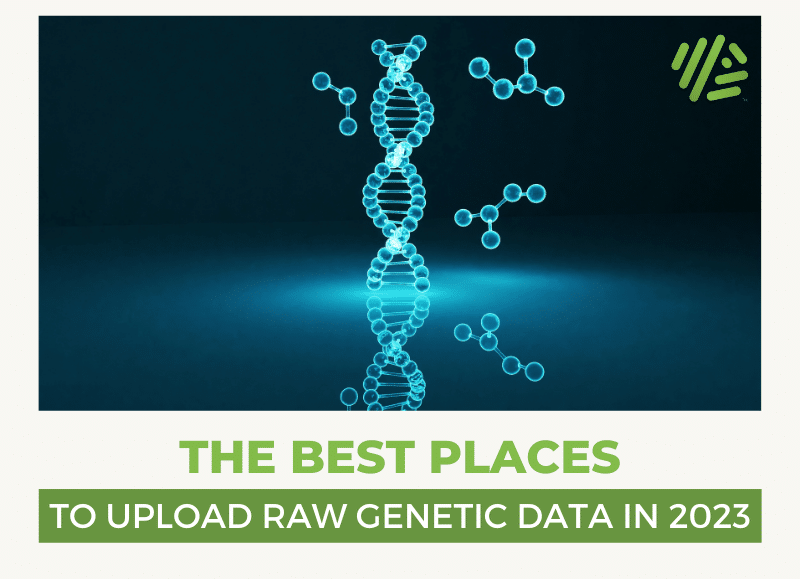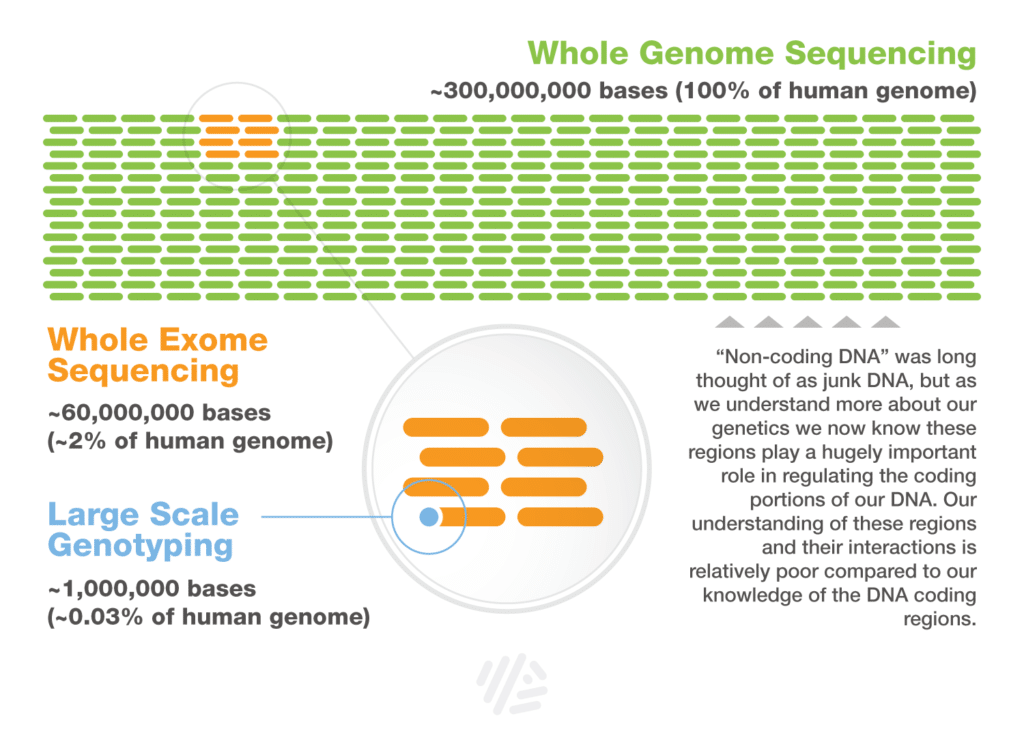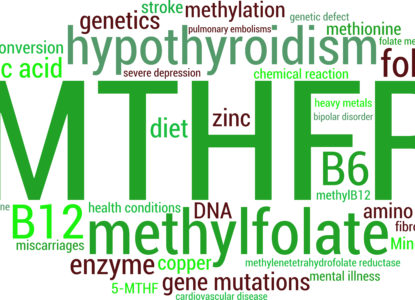The 7 Best Companies to Interpret 23andme Raw Data via Upload

Contents
With new studies published regularly now, the market for consumer genomics products has been exploding, especially in the nutrition and health space.
With millions of people having ordered genetic testing kits, it’s only natural many of us are looking for ways to get more from the raw data provided by the most popular providers like 23andme, Ancestry, and My Heritage DNA.
Note: 23andme has made it much harder to download raw data this year
Which genes are included in raw data?
Both 23andme and Ancestry offer up a limited subset of genes for their customers. As the name denotes, Ancestry.com is more focused on family lineage, whereas 23andme places a greater emphasis on health and wellness. However, it is important to realize that neither provider offers full genome sequencing. Instead they “genotype.”
While full genome sequencing looks at all your genes, genotyping analyzes the most studied genes (only a small fraction of the genome). You could think of it this way: on a long road trip cross country, genome sequencing includes every city, no matter how small, in its final map. By contrast, genotyping picks only the major cities. We created the visual below to better demonstrate the difference between sequencing the whole genome vs. genotyping.

It’s important to realize that the raw data you get from the major providers only offers about 0.04% of your genome. While the interface and content emphasis is different for different providers, Ancestry and 23andme report on a very similar subset of genes. Further, the big boys are constantly changing the game as to which genes are included in which version of their product.
For example, Gene Food is a one of the sites that will process raw data for you from 23andme or Ancestry. Part of what we do with this data is to score our clients for fat metabolism, antioxidant capacity and also more obscure processes like histamine clearance. Based on that score, we place people into one of 20 diet types and offer them access to a custom recipe database. But here’s the kicker: 23andme and Ancestry routinely change the genes they report on from version to version, so people who bought kits earlier have more genetic information on certain markers than do others. The histamine genes are a good example. There are more AOC1 genes in version 4 of 23andme than there are version 5.
Having said that, the reason there are a good number of providers who can offer insights into raw data is because the files are easy to read. They come in simple text files making it straightforward for software programs to parse and score data.
If you’re looking for the top destinations to take your raw data, you’ve come to the right place. Below, I’ve listed the providers I have used and trusted with my raw data.
#1. Gene Food
Best for: anyone interested in learning more about nutrition, supplements, core health insights, methylation
You knew we were going to include our own app, right?
For those of you interested in a resolution to the diet wars, we created our custom nutrition plan. Dr. Aaron Gardner, our resident geneticist and head of research, drew up an algorithm that will place you into one of 20 diet types based on your raw genetic data from 23andme or Ancestry.
For example, carriers of a gene known to increase risk for dementia, called APOE4, will usually fall into one of our diet types that is lower in saturated fat from all sources, but especially from animal products. Those that carry more robust fat genes, but who are likely to have problems regulating blood sugar levels, would fall into a more Paleo style of Mediterranean diet that limits carbs, especially refined carbs. Once you have your assigned diet type, our recipe database comes alive with a system of eating that is designed for your DNA and easy to follow.
Later in the report, we dive into more technical issues such as MTHFR and methylation status, tips for building an optimal supplement regimen, as well as sterol absorption and genes that affect detox pathways.
#2. LiveWello
Best for: health care professionals and their clients
LiveWello is in a category of sites that use genetic raw data to offer insight into disease states and possible risks for serious illness. While the site can be a useful place to research whether you carry an obscure genetic marker, or to share a story in one the genetics forums, overall my experience with LiveWello and Promothease was that of drinking from a fire hose. There is so much information that it becomes difficult to separate the good from the highly speculative.
Having said that, if you are simply looking for information about whether you carry certain MTHFR variants, or other more “popular” markers like COMT, LiveWello could be just what the doctor ordered.
Since LiveWello allows for the management of multiple profiles from the same account, and because of the ability to create custom genetics reports and to search by SNP, this site could also be a good option for clinicians and health care providers.
#3. Self Decode
Best for: a deep dive into genetics and lab test analysis
We have been impressed with the growth of Self Decode over the last two years in particular, and decided to add them to this list for 2023. Originally founded by Joe Cohen on a website known as Self Hacked, Self Decode offers comprehensive test kits and lab testing analysis, but also offers raw data upload services. Self Decode has built over 150 health reports available to customers who upload raw data, including the basics like MTHFR status. The downside with Self Decode is cost, some of the plans can run well over $300.
#4. Promethease
Best for: health care professionals and their clients
Data from Promethease is sourced from SNPedia, a large, and very technical database of genes and common polymorphisms. This is one of the genetics sites I used when I was first getting started with genetics research. Ahhh, the good old days of that terrible feeling where reading a genetics report completely out of context convinced me I was sure to develop X, or Y disease. Unless you have a science or genetics background, Promethease is a less user friendly LiveWello.
One nice feature of the service is that you can view some sample reports without uploading your raw data. For example, here is a sample report they link to on their homepage that uses 23andme data. Most reports on Promethease cost $12.
Again, for a geneticist or someone with deep scientific knowledge, this site may prove very useful. For the average consumer, I think it’s a stress multiplier and another fire hose.
#5. Genetic Genie
Best for: those just getting started on their genetics journey, those who just want to know MTHFR status
I’ve always liked Genetic Genie. It’s a free report (although you have the option to donate) that gives a concise methylation report with a solid panel of SNPs to choose from. Users also have the option of choosing their detox panel, also free. Genetic Genie is a straightforward way of using raw genetic data to get some of the top line information 23andme and Ancestry choose not to report on.
#6. Genomelink
Best for: Entertainment and fun genetics reports
I wrote a review recently about Genomelink, the new genomics company backed by investors at Y Combinator. The advantage of Genomelink is the platform has access to the 23andme API, which means users can port their raw data into the app without taking the step of downloading their raw data files from 23andme (a process that has become much harder as of late). Genomelink offers a suite of tests for personality traits, some ancestry reports, basic micronutrients, and several other bits of information that skew towards entertainment value.
Some Reddit posters have suggested that Genomelink is a scam due to poor customer service. But, as I wrote in my review, I trust the company based on their impressive investor list and the fact that they were granted access to the 23andme API. Unfortunately, the product itself could use some work in my opinion.
#7. StrataGene
Best for: health care professionals and their clients
StrataGene is the brain child of Dr. Ben Lynch of MTHFR and Dirty Genes fame. Dr. Lynch was one of the pioneers of nutrigenomics and is widely recognized as an authority on using genetics as a tool for better integrative medicine. He is also the founder of a supplement company called Seeking Health. Seeking Health is thought of as a high quality brand that sources good ingredients. To his credit, at least when I used StrataGene a few years back, the reports were not making supplement recommendations.
StrataGene is another report that uses raw genetic data to provide technical reports. Most consumers will not be able to get much from these reports unless they are working with a healthcare provider.
Highlights for StrataGene are the folate cycle (methylation), methionine cycle, and transsulfuration and histamine pathways. All of the pathways are highlighted with a chart which shows the user the biochemical reactions at play driving different outcomes and where their pathway may be disrupted.
This is a report that can be taken to a doctor versed in nutrigenomics, but it will be too complicated for most consumers. Note for Ancestry customers, StrataGene only accepts V2.
Closing Thoughts
The genetics world is changing rapidly. Steve Jobs was reported to have paid $100,000 to have his genome sequenced. Today, that same process would cost $1,000.
As the cost comes down and the technology evolves, full genome sequencing for everyone is probably only a few years away.
For now, the genotyping services like 23andme and Ancestry provide value, both from a health and entertainment standpoint. Extracting your raw data will give you access to a far greater range of genes than the large providers discuss in their interfaces. However, careful the conclusions you draw from the data. In some cases, the knowledge can be powerful. In others, trying to piece together mechanisms even some of the best scientists have yet to understand can leave people stressed out and confused.



